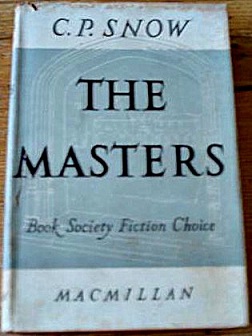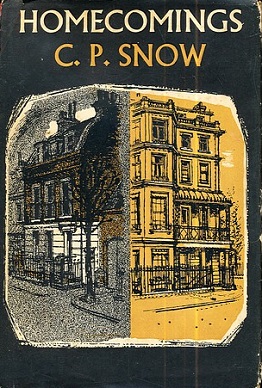
Look to Windward is a science fiction novel by Scottish writer Iain M. Banks, first published in 2000. It is Banks' sixth published novel to feature the Culture. The book's dedication reads: "For the Gulf War Veterans". The novel takes its title from a line in T. S. Eliot's poem The Waste Land:

The Light and the Dark is the fourth novel in C. P. Snow's Strangers and Brothers series. The book portrays narrator Lewis Eliot's friendship with Roy Calvert, and Calvert's inner turmoil and quest for meaning in life. Calvert was based on Snow's friend, Coptic scholar, Charles Allberry. Their relationship is developed further in The Masters.

Corridors of Power is the ninth book in C. P. Snow's Strangers and Brothers series. Its title had become a household phrase referring to the centres of government and power after Snow coined it in his earlier novel, Homecomings.

George Passant is the first published of C. P. Snow's series of novels Strangers and Brothers, but the second according to the internal chronology. It was first published under the name Strangers and Brothers. It was published in the United Kingdom in 1940 and in the U.S. in 1960.

Mr. Popper's Penguins is a children's book written by Richard and Florence Atwater, with illustrations by Robert Lawson, originally published in 1938. It tells the story of a poor house painter named Mr. Popper and his family, who live in the small town of Stillwater in the 1930s. The Poppers unexpectedly come into possession of a penguin, Captain Cook. The Poppers then receive a female penguin from the zoo, who mates with Captain Cook to have 10 baby penguins. Before long, something must be done, lest the penguins eat the Poppers out of house and home.

Grass for His Pillow is the second novel in Lian Hearn's Tales of the Otori trilogy, published in 2003. The events in the novel cover a period of approximately 6 months, following directly after those in Across the Nightingale Floor.
The Sisters Grimm is a children's fantasy series written by Michael Buckley and illustrated by Peter Ferguson. The series is partially based on the works and lives of the Brothers Grimm, with the titular protagonists, Sabrina Grimm and Daphne Grimm, being their fictional descendants, and the supporting cast featuring many characters from the Grimms’ collection of fairytales.
Evaline Ness was an American commercial artist, illustrator, and author of children's books. She illustrated more than thirty books for young readers and wrote several of her own. She used a great variety of artistic media and methods.

Bones of the Moon is a novel by American writer Jonathan Carroll, depicting the real and dream life of a young woman. Like many of Carroll's works, it straddles the horror and fantasy genres.

Doctor Sleep is a 2013 horror novel by American writer Stephen King and the sequel to his 1977 novel The Shining. The book reached the first position on The New York Times Best Seller list for print, ebook, and hardcover fiction. Doctor Sleep won the 2013 Bram Stoker Award for Best Novel.

Time of Hope is the first chronological entry in C. P. Snow's series of novels Strangers and Brothers, and the third to be published. It depicts the beginning of Lewis Eliot's life, with a childhood in poverty in a small English town at the beginning of the 20th century.

The Masters is the fifth novel in C. P. Snow's series Strangers and Brothers. It involves the election of a new Master at narrator Lewis Eliot's unnamed Cambridge College, which resembles Christ's College where Snow was a fellow. The 1951 novel's dedication is "In memory of G. H. Hardy", the Cambridge mathematician. It was the first of the Strangers and Brothers series to be published in the United States.

The Conscience of the Rich is the seventh published of C. P. Snow's series of novels Strangers and Brothers, but the third according to the internal chronology. It details the lives of Charles, Katherine and their father, Leonard March, a wealthy Jewish family. Lewis Eliot narrates the story of the conflicting politics of wealth and pre-World War II socialism in England.

Mira, Mirror is a 2004 young adult fantasy novel written by Mette Ivie Harrison. The story of the novel is told from the viewpoint of the magic mirror from the fairy tale "Snow White". "Mira" is a main character.

The Road to Character is the fourth book written by journalist David Brooks. Brooks taught an undergraduate course at Yale University for three years during the 2010s on humility, the subject of this book.

Wolf in the Snow is a 2017 wordless picture book by Matthew Cordell. The book was favorably received by critics and won the 2018 Caldecott Medal. The story has drawn comparisons to fairy tales like Little Red Riding Hood. The nearly wordless book tells the story of a girl and wolf who each get lost in the snowstorm. Cordell used distinctive illustration techniques for the girl and the wolf.

Last Things is the eleventh and final installment of C. P. Snow's series of novels Strangers and Brothers.

The Affair is the eighth book in C. P. Snow's Strangers and Brothers series. The events return to the Cambridge college of The Masters. It is once again narrated by Lewis Eliot.

Homecomings is the seventh book in C. P. Snow's Strangers and Brothers series. The events concern the personal life of narrator Lewis Eliot.

The New Men, published in 1954, is the sixth novel in C. P. Snow's series Strangers and Brothers.

















